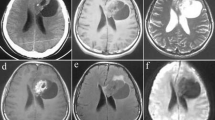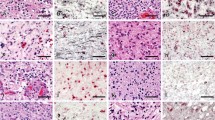Abstract
Mixed neuronal-glial tumors of the central nervous system display a wide spectrum of differentiation. Among them, the papillary glioneuronal tumor (PGNT) is characterized by pseudopapillary structures composed of astroglial cells covering hyalinized vessels, and by neurocytic, ganglioid and ganglion cells. In addition, a “nonspecific” cell type, not similar to either astrocytes or neurocytes, has been recognized since the initial reports. Recently, minigemistocytic cells and a population immunostained by anti-Olig2 antibody have also been recognized in PGNT. Olig2 is a transcription factor that is specific for the cellular phenotype of oligodendrocytes. The aim of this study was to further investigate the histological diversity of PGNT. We examined six cases of PGNT, each of which showed Olig2 immunopositivity. Minigemistocytes were encountered in three cases at close proximity to the Olig2-positive area. Olig2-positive cells were negative for glial fibrillary acidic protein (GFAP) and neuronal nuclear antigen by double immunostaining, and mainly occupied the interpapillary area laterally adjacent to the GFAP-positive cells. They had relatively small, round and vesicular nuclei, and were formerly regarded as neurocytic cells or nonspecific cellular elements. Fluorescence in situ hybridization targeting chromosome 1p failed to demonstrate any deletion. This study disclosed an additional cellular component of PGNT that is characterized by Olig2 positivity, suggestive of oligodendroglial phenotype, and the results also encourage us to investigate oligodendroglial participation in various glioneuronal tumors.




Similar content being viewed by others
References
Aguirre-Cruz L, Mokhtari K, Hoang-Xuan K, Marie Y, Criniere E, Taillibert S, Lopes M, Delattre JY, Sanson M (2004) Analysis of the bHLH transcription factors Olig1 and Olig2 in brain tumors. J Neurooncol 67:265–271
Barnes NP, Pollock JR, Harding B, Hayward RD (2002) Papillary glioneuronal tumour in a 4-year-old. Pediatr Neurosurg 36:266–270
Bouvier C, Bartoli C, Aguirre-Cruz L, Virard I, Colin C, Fernandez C, Gouvernet J, Figarella-Branger D (2003) Shared oligodendrocyte lineage gene expression in gliomas and oligodendrocyte progenitor cells. J Neurosurg 99:344–350
Bouvier-Labit C, Daniel L, Dufour H, Grisoli F, Figarella-Branger D (2000) Papillary glioneuronal tumour: clinicopathological and biochemical study of one case with 7-year follow up. Acta Neuropathol 99:321–326
Broholm H, Madsen FF, Wagner AA, Laursen H (2002) Papillary glioneuronal tumor: a new tumor entity. Clin Neuropathol 21:1–4
Cairncross JG, Ueki K, Zlatescu MC, Lisle DK, Finkelstein DM, Hammond RR, Silver JS, Stark PC, Macdonald DR, Ino Y, Ramsay DA, Louis DN (1998) Specific genetic predictors of chemotherapeutic response and survival in patients with anaplastic oligodendrogliomas. J Natl Cancer Inst 90:1473–1479
Ebato M, Tsunoda A, Maruki C, Ikeya F, Okada M (2003) Papillary glioneuronal tumor with highly degenerative pseudopapillary structure accompanied by specific abortive glial cells: a case report (in Japanese). No Shinkei Geka 31:1185–1190
Fuller CE, Schmidt RE, Roth KA, Burger PC, Scheithauer BW, Banerjee R, Trinkaus K, Lytle R, Perry A (2003) Clinical utility of fluorescence in situ hybridization (FISH) in morphologically ambiguous gliomas with hybrid oligodendroglial/astrocytic features. J Neuropathol Exp Neurol 62:1118–1128
Hemmati HD, Nakano I, Lazareff JA, Masterman-Smith M, Geschwind DH, Bronner-Fraser M, Kornblum HI (2003) Cancerous stem cells can arise from pediatric brain tumors. Proc Natl Acad Sci USA 100:15178–15183
Ishiuchi S, Nakazato Y, Iino M, Ozawa S, Tamura M, Ohye C (1998) In vitro neuronal and glial production and differentiation of human central neurocytoma cells. J Neurosci Res 51:526–535
Ishizawa T, Komori T, Ishizawa K, Adachi J, Nishikawa R, Matsutani M, Hirose T (2004) A case of papillary glioneuronal tumor with rhabdoid cell components (in Japanese). Brain Tumor Pathol 21 Suppl:65
Kim DH, Suh YL (1997) Pseudopapillary neurocytoma of temporal lobe with glial differentiation. Acta Neuropathol 94:187–191
Kitayama Y, Igarashi H, Sugimura H (1999) Amplification of FISH signals using intermittent microwave irradiation for analysis of chromosomal instability in gastric cancer. J Clin Pathol Mol Pathol 52:357–359
Kitayama Y, Igarashi H, Sugimura H (2000) Initial intermittent microwave irradiation for fluorescence in situ hybridization analysis in paraffin-embedded tissue sections of gastrointestinal neoplasia. Lab Invest 80:779–781
Komori T, Scheithauer BW (1998) Concerning report by Kim and Suh. Acta Neuropathol 96:109–110
Komori T, Scheithauer BW, Anthony DC, Rosenblum MK, McLendon RE, Scott RM, Okazaki H, Kobayashi M (1998) Papillary glioneuronal tumor: a new variant of mixed neuronal-glial neoplasm. Am J Surg Pathol 22:1171–1183
Lamszus K, Makrigeorgi-Butera M, Laas R, Westphal M, Stavrou D (2003) September 2002: 24-year-old female with a 6-month history of seizures. Brain Pathol 13:115–117
Ligon KL, Alberta JA, Kho AT, Weiss J, Kwaan MR, Nutt CL, Louis DN, Stiles CD, Rowitch DH (2004) The oligodendroglial lineage marker OLIG2 is universally expressed in diffuse gliomas. J Neuropathol Exp Neurol 63:499–509
Lu QR, Yuk D, Alberta JA, Zhu Z, Pawlitzky I, Chan J, McMahon AP, Stiles CD, Rowitch DH (2000) Sonic hedgehog-regulated oligodendrocyte lineage genes encoding bHLH proteins in the mammalian central nervous system. Neuron 25:317–329
Lu QR, Park JK, Noll E, Chan JA, Alberta J, Yuk D, Alzamora MG, Louis DN, Stiles CD, Rowitch DH, Black PM (2001) Oligodendrocyte lineage genes (OLIG) as molecular markers for human glial brain tumors. Proc Natl Acad Sci USA 98:10851–10856
Marie Y, Sanson M, Mokhtari K, Leuraud P, Kujas M, Delattre JY, Poirier J, Zalc B, Hoang-Xuan K (2001) OLIG2 as a specific marker of oligodendroglial tumour cells. Lancet 358:298–300
McLendon RE, Provenzale J (2002) Glioneuronal tumors of the central nervous system. Brain Tumor Pathol 19:51–58
Nakazato Y, Ishizeki J, Takahashi K, Yamaguchi H, Kamei T, Mori T (1982) Localization of S-100 protein and glial fibrillary acidic protein-related antigen in pleomorphic adenoma of the salivary glands. Lab Invest 46:621–626
Ohnishi A, Sawa H, Tsuda M, Sawamura Y, Itoh T, Iwasaki Y, Nagashima K (2003) Expression of the oligodendroglial lineage-associated markers Olig1 and Olig2 in different types of human gliomas. J Neuropathol Exp Neurol 62:1052–1059
Perry A, Scheithauer BW, Macaulay RJ, Raffel C, Roth KA, Kros JM (2002) Oligodendrogliomas with neurocytic differentiation. A report of 4 cases with diagnostic and histogenetic implications. J Neuropathol Exp Neurol 61:947–955
Prayson RA (2000) Papillary glioneuronal tumor. Arch Pathol Lab Med 124:1820–1823
Prayson RA, Castilla EA, Hartke M, Pettay J, Tubbs RR, Barnett GH (2002) Chromosome 1p allelic loss by fluorescence in situ hybridization is not observed in dysembryoplastic neuroepithelial tumors. Am J Clin Pathol 118:512–517
Raff MC, Miller RH, Noble M (1983) A glial progenitor cell that develops in vitro into an astrocyte or an oligodendrocyte depending on culture medium. Nature 303:390–396
Reifenberger G, Kros JM, Burger PC, Louis DN, Collins VP (2000) Oligodendroglial tumours. In: Kleihues P, Cavenee WK (eds) Pathology and genetics. Tumours of the nervous system. IARC Press, Lyon, pp 55–70
Reifenberger J, Reifenberger G, Liu L, James CD, Wechsler W, Collins VP (1994) Molecular genetic analysis of oligodendroglial tumors shows preferential allelic deletions on 19q and 1p. Am J Pathol 145:1175–1190
Richardson WD, Smith HK, Sun T, Pringle NP, Hall A, Woodruff R (2000) Oligodendrocyte lineage and the motor neuron connection. Glia 29:136–142
Riemenschneider MJ, Koy TH, Reifenberger G (2004) Expression of oligodendrocyte lineage genes in oligodendroglial and astrocytic gliomas. Acta Neuropathol 107:277–282
Shibuya M, Yamazaki H, Sugiyama M (2003) A case of papillary glioneuronal tumor (in Japanese). Brain Tumor Pathol 20 suppl:73
Shintaku M, Yutani C (2004) Oligodendrocytes within astrocytes (“emperipolesis”) in the white matter in Creutzfeldt-Jakob disease. Acta Neuropathol 108:201–206
Singh SK, Clarke ID, Terasaki M, Bonn VE, Hawkins C, Squire J, Dirks PB (2003) Identification of a cancer stem cell in human brain tumors. Cancer Res 63:5821–5828
Smith JS, Perry A, Borell TJ, Lee HK, O’Fallon J, Hosek SM, Kimmel D, Yates A, Burger PC, Scheithauer BW, Jenkins RB (2000) Alterations of chromosome arms 1p and 19q as predictors of survival in oligodendrogliomas, astrocytomas, and mixed oligoastrocytomas. J Clin Oncol 18:636–645
Szuchet S (1995) The morphology and ultrastructure of oligodendrocytes and their functional implications. In: Kettenmann H, Ransom BR (eds) Neuroglia. Oxford University Press, New York, pp 23–43
Tanaka Y, Hirato J, Makita Y, Nakazato Y (2004) A case of papillary glioneuronal tumor (in Japanese). Brain Tumor Pathol 21 Suppl:66
Tsukayama C, Arakawa Y (2002) A papillary glioneuronal tumor arising in an elderly woman: a case report. Brain Tumor Pathol 19:35–39
Wikstrand CJ, Fung KM, Trojanowski JQ, McLendon RE, Binger DD (1998) Antibodies and molecular immunology. Immunohistochemistry and antigens of diagnostic significance. In: Binger DD, McLendon RE, Bruner JM (eds) Russell and Rubinstein’s pathology of tumors of the nervous system, 6th edn. Arnold, London, pp 251–304
Yokoo H, Isoda K, Sakura M, Sasaki A, Hirato J, Nakazato Y (2000) A novel monoclonal antibody that recognizes human perivascular cells of the central nervous system under a specific immune reaction. Neuropathology 20:216–220
Yokoo H, Nobusawa S, Takebayashi H, Ikenaka K, Isoda K, Kamiya M, Sasaki A, Hirato J, Nakazato Y (2004) Anti-human Olig2 antibody as a useful immunohistochemical marker of normal oligodendrocytes and gliomas. Am J Pathol 164:1717–1725
Zhou Q, Wang S, Anderson DJ (2000) Identification of a novel family of oligodendrocyte lineage-specific basic helix-loop-helix transcription factors. Neuron 25:331–343
Acknowledgements
The authors would like to express their gratitude to the following contributors: Dr. Jun-ichi Adachi and Prof. Masao Matsutani (Department of Neurosurgery, Saitama Medical School), and Dr. Makoto Sugiyama (Department of Neurosurgery, Eastern Japan Medical Center). This work was supported in part by Grants-in-Aid for Scientific Research (nos. 15300113 and 14570159) from the Japanese Ministry of Education, Culture, Sports, Science and Technology.
Author information
Authors and Affiliations
Corresponding author
Rights and permissions
About this article
Cite this article
Tanaka, Y., Yokoo, H., Komori, T. et al. A distinct pattern of Olig2-positive cellular distribution in papillary glioneuronal tumors: a manifestation of the oligodendroglial phenotype?. Acta Neuropathol 110, 39–47 (2005). https://doi.org/10.1007/s00401-005-1018-4
Received:
Revised:
Accepted:
Published:
Issue Date:
DOI: https://doi.org/10.1007/s00401-005-1018-4




